Leafy Exercises
A New Exercise: Un-Rei-King
A few years ago I wrote that, among the many benefits of gardening is the opportunity it offers for varied, productive exercise. At that time I highlighted rei-king (ray-KING). Now, let’s add un-rei-king to join rei-king, zumba, cardiofunk, and other ways modern humans build and maintain sleek, fit bodies.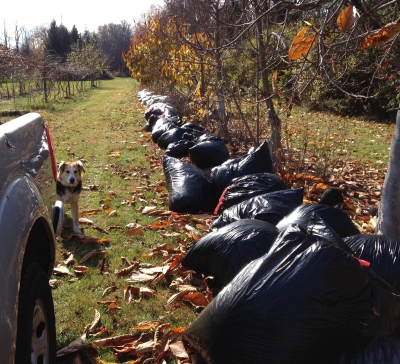
In fact, many people, including couch potatoes and nongardeners, practice rei-king this time of year. You can see them practicing this sweeping motion on their lawn amidst gathering piles of leaves.
Un-rei-king is a more rare form of exercise, of which I am a practitioner. Rei-kingers gather those piles of leaves that are a byproduct of their exercise into large bags, then muscle them curbside. I gather said bags, muscle them gardenside, and launch into un-rei-king. That is, I employ a similar motion to rei-king, except more jagged and with a pitchfork, spreading the leaves once I have freed them from their baggy confines.
Feeding the Soil to Feed the Plants
Exercise aside, my goal is to blanket the ground beneath one row of pear trees, a large bed of gooseberry bushes and grapes, and another long row of pawpaw trees and blackcurrant bushes with 6 to 12 inches of autumn leaves. That fluffy blanket will hold autumn’s warmth in the soil long after bare soil has frozen solid to a few inches depth.
I have to practice un-rei-king every year in November because by this time next year, that leafy blanket will have pretty much evanesced into thin air, literally. Leaves are composed mostly of carbon, hydrogen, and oxygen which becomes, over the course of the year, carbon dioxide and water vapor.
All this may seem like wasted effort (except for the exercise), but it’s not. The transmutation of leaves to carbon dioxide and water happens as bacteria, fungi, worms, and other soil organisms gobble up the leaves. Mostly, these creatures are beneficial, helping plants to fight off pests.
Leaves are mostly, but not only carbon, hydrogen, and oxygen; also contained therein are a slew of minerals needed by plants. In addition to feeding soil life, as the leaves decompose they’re also fertilizing the ground. More than that, natural, organic compounds are being formed that help make minerals already in the soil more accessible to plants.
All this living activity also releases into the ground other natural, organic compounds that aggregate soil particles to create pores for good aeration as well as to act spongy to help the ground, at the same time, hold moisture.
All of which is to say that after years of un-rei-king, my soil is soft, fluffy, moist, and very much alive. The pear trees, gooseberry bushes, etc. love it.
Uh-Oh, Mice
Meadow mice also enjoy the fluffy blanket, beneath which they can nest — and feed on plant roots and bark! So as I lay down that blanket, I’m also putting an 18-inch high cylinder of hardware cloth or some commercial wrap around the bottom of the tree trunks to fend off the mice.
I’ll also keep the leaves a few inches back off the trunks to keep mice at bay and avoid rotting of the trunk. Such precautions are unnecessary for shrubs, whose fresh supplies of stems that grow each spring at ground level can replace any chewed ones. (That’s why they are shrubby.)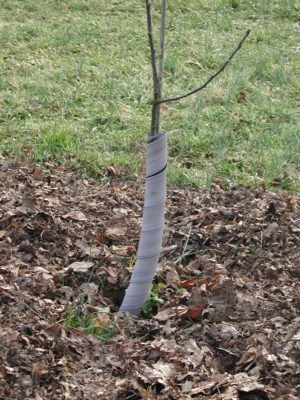
And Some Leaves — For Next Year
Not yet finished with leaves. Every autumn a local landscaper dumps a truckload of vacuumed-up leaves here. On that pile I grow watermelons all summer long. By now, the leaf pile has about half-decomposed into “leaf mold” which is pretty much the same thing as compost. Except rougher, because it’s not yet in the final stages of decomposition.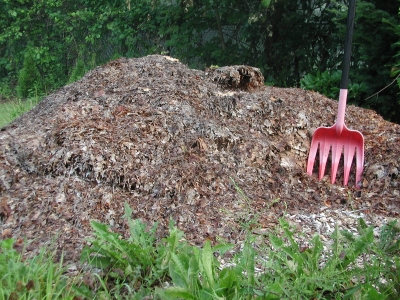
Being richer in nutrients than freshly fallen leaves, leaf mold is just the ticket for loading into a cart for mulching some special plants: a young chestnut tree, filbert bushes, and semi-dwarf apple trees. Plus, it brings along all the aforementioned benefits of raw leaf mulch.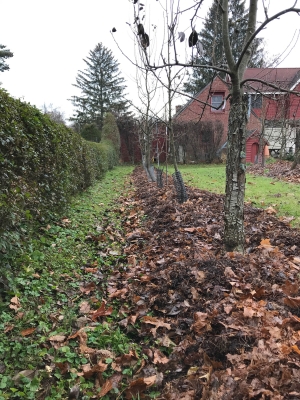
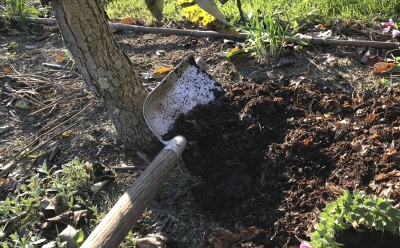
NOTE: I’m not sure if the comments section is working on this page, so, if you will, please some of you readers write a comment so I can see if a fix is needed. Thanks.

